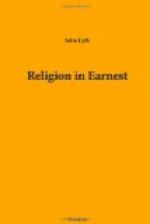I.
Antecedents.
“A good man leaveth
an inheritance to his children’s
children.” Prov. xiii.
22.
Within the grounds attached to the mansion of the Earl of Harewood, in the West Riding of Yorkshire, is a substantial and well-built farm house, furnished with suitable outbuildings, and surrounded by a fine cluster of fruit-trees. It stands on the side of a hill, which slopes gently down to the river Wharfe, and commands a prospect, which, though not extensive, is singularly picturesque. In front, a little to the right, the ruined fortress of Harewood peeps out of a scattered wood, which crowns the summit of the hill, and shelters one of the neatest and trimmest villages in England. On the left flows the beautiful Wharfe but soon loses itself among the adjacent heights. Behind, towers the logan of Arlmes cliff, an interesting relic of druidical skill and superstition; while Riffa wood and Ottley Shevin complete the beauty of the landscape. A row of trees, protected by a lofty wall, effectually conceals the house we have mentioned, from the highroad, which for some distance runs at the foot of the hill and almost parallel to the river. Formerly there was only a sandy lane, which passed immediately in front of the house, and winding up the hill, entered the village between the castle and the church. From this circumstance the adjoining farm was called Sandygate, but with the changes that have taken place, the appellation is now almost forgotten, although the house still retains the name of its original occupant, and is known in the neighbourhood as ‘Stables House.’
Just a hundred years ago, this house was built for the accommodation of Wm. Stables, a wealthy yeoman, who resided at Heatherwick (now Stanke), about a mile from Harewood; and who, successful in the cultivation of his paternal acres, sought to extend his interests by renting the farm of Sandygate. His removal was however unpropitious to his domestic happiness; for entering the new house before it was fully fit for occupation, his wife, already in a delicate state of health, took cold and died; leaving him with four children, the eldest of whom was six years old, and the youngest but an infant. Mr. S. is said to have been a shrewd and sensible man, of strict morals and unbending integrity; but withal stern and inflexible in disposition, pharisaic, and a bigoted churchman. His punctuality in the performance of outward religious duties, and the regular payment of his dues, with now and then a fat sheep given to the poor, secured him among his neighbours the reputation of being a good Christian. As might be supposed, his children were trained with great severity, and educated in the straitest sect of their religion. Collect and catechism were duly committed to memory, prayers regularly read in the family, the Sabbath rigorously observed,




